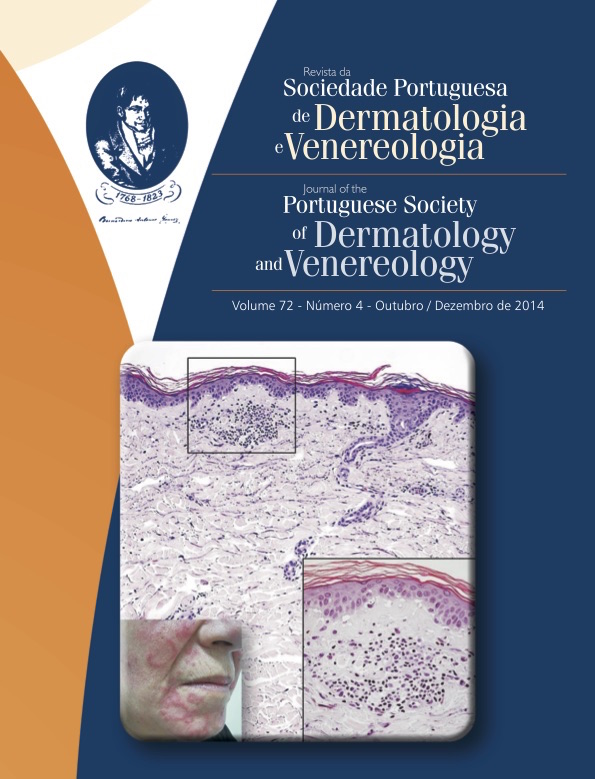RECALCITRANT HERPETIC GENITAL ULCERS TREATED WITH IMIQUIMOD IN ASSOCIATION WITH VALACYCLOVIR
Abstract
The herpes simplex virus is a common cause of genital ulcers. In the immunocompromised, it may have an atypical presentation, with exuberant lesions, frequently resulting in resistance to the mainstream therapeutic options, and a consequent prolonged course.
A 25-year-old male with a previous history of common variable immunodeficiency, presented with herpetic extensive genital ulcerations on the inguinoscrotal region. Despite a long period of valacyclovir therapy, the patient remained symptomatic. We decided to add topical 5% imiquimod as an adjunctive therapy, and observed a completed resolution of the ulcerations.
Imiquimod, working as a local immunomodulator, stimulates the anti-viral immunologic response. Therefore, it is an alternative in recalcitrant herpetic lesions, especially in the setting of immunosuppression.
Downloads
References
Weiss H. Epidemiology of herpes simplex virus type 2 infection in the developing world. Herpes. 2004; 11(suppl 1):24A-35A.
Da Costa JB, Domingues D, Castro R, Exposto F. Úlceras genitais causadas por infecções sexualmente transmissíveis. Actualização do Diagnóstico e Terapêuticas,
e a sua Importância na Pandemia do VIH. Acta Med Port. 2006; 19(4):335-42.
Seara Alves S, Lisboa C, Xerinda S, Azevedo F. Herpes genital numa consulta de infecções sexualmente transmissíveis. Revista Soc Port Dermatol Venereol. 2007;65(1):57-63.
Safrin S, Ashley R, Houlihan C, Cusick PS, Mills J. Clinical and serologic features of herpes simplex virus infection in patients with AIDS. AIDS. 1991; 157:209-10.
Leming PD, Martin SE, Zwelling LA. Atypical herpes simplex (HSV) infection in a patient with Hodgkin’s disease. Cancer. 1984; 54:3043-7.
Burke EM, Karp DL, Wu TC, Corio RL. Atypical oral presentation of herpes simplex virus infection in a patient after orthotopic liver transplantation. Eur Arch Otorhinolaryngol. 1994; 251(5):301-3.
Beasley KL, Cooley GE, Kao GF, Lowitt MH, Burnett JW, Aurelian L. Herpes simplex vegetans: atypical genital herpes infection in a patient with common variable immunodeficiency. J Am Acad Dermatol. 1997; 37(5 Pt 2):860-3.
Levin MJ, Bacon TH, Leary JJ. Resistance of herpes simplex virus infections to nucleoside analogues in HIV-infected patients. Clin Infect Dis. 2004; 39(Suppl 5):S248-57.
Andrei G, Snoeck R. Herpes simplex virus drug-resistance: new mutations and insights. Curr Opin Infect Dis. 2013; 26(6):551-60.
Notarangelo LD, Casanova JL, Conley ME, Chapel H, Fischer A, Puck J, et al. Primary immunodeficiency diseases: an update from the international Union of Immunological Societies Primary Immunodeficiency Diseases Classification Committee Meeting in Budapest, 2005. J Allergy Clin Immunol. 2006; 117:883-96.
Haveman LM, Scherrenburg J, Maarschalk-Ellerbroek LJ, Hoek PD, Schuurman R, de Jager W, et al. T-cell response to viral antigens in adults and children with common variable immunodeficiency and specific antibody deficiency. Clin Exp Immunol. 2010; 161(1):108-17.
Barde C, Piguet V, Pechère M, Masouye I, Saurat JH, Wunderli W, et al. Management of resistant mucocutaneous herpes simplex infections in AIDS patients: a clinical and virological challenge. HIV Med. 2011; 12(6):367-73.
Holmes A, McMenamin M, Mulcahy F, Bergin C. Thalidomide therapy for the treatment of hypertrophic herpes simplex virus-related genitalis in HIV-infected individuals. Clin Infect Dis. 2007; 44:96-9.
Lestre SI, João A, Carvalho C, Serrão VV. Hypertrophic perianal herpes successfully treated with imiquimod. An Bras Dermatol. 2011; 86(6):1185-8.
Barbosa Ldo N, Souto R, Furtado AL, Gripp AC, Daxbacher E. Association of oral acyclovir and imiquimod
for the treatment of hypertrophic genital herpes simplex in HIV positive patients: report of two cases. An Bras Dermatol. 2011; 86(5):1043-5.
Kan Y, Okabayashi T, Yokota S, Yamamoto S, Fujii N, Yamashita T. Imiquimod suppresses propagation of herpes simplex virus 1 by upregulation of cystatin A via the adenosine receptor A1 pathway. J Virol. 2012; 86(19):10338-46.
McKendry A, Narayana S, Browne R. Atypical presentations of genital herpes simplex virus in HIV-1 and HIV-2 effectively treated by imiquimod. Int J STD AIDS. 2014 (in press).
All articles in this journal are Open Access under the Creative Commons Attribution-NonCommercial 4.0 International License (CC BY-NC 4.0).








